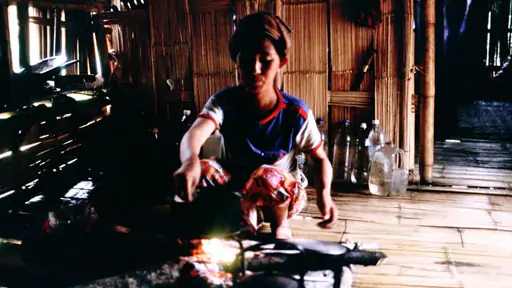Indigenous Calendar July, 2013: Lahu Non-Freedom of Movement in Thailand

Thailand is among the most developed countries in the region of Southeast Asia. Many of its citizens enjoy a modern lifestyle and a relatively strong economy. I took this photo inside the kitchen of a Lahu house in northern Thailand where I was invited to spend the night many years ago. It is typical of kitchens inside Lahu houses in the region then and today. The open, wood-burning hearth on the floor is used to cook all meals as well as to boil water. The kitchen is also used as the center of household social life.
The Lahu people began migrating away from their native southwestern China around two hundred years ago. Today in the region they live in what are now Burma (Myanmar), the Lao People's Democratic Republic, Thailand and Vietnam. In each of these countries the vast majority of the Lahu do not enjoy the same lifestyle or economic benefits as do members of the countries' mainstream society. Instead they are second-class citizens.
In Thailand today almost all the Lahu who live there were born there. Yet most of them have a "no citizen" status in that they are not recognized as Thai citizens by the government. This may not sound like it would be a big hindrance since most Lahu cannot afford the cost of traveling outside of Thailand. But the hindrance comes from attempting to travel within Thailand. Due to their non-citizen status the Lahu (and many of Thailand's other indigenous people) are severely restricted in terms of where they can travel — usually being limited to the district or town where they were born. This restriction is ruthlessly enforced: I experienced more police checkpoints on the roads of northern Thailand than anywhere else in the region outside of Burma.
Although the house where I stayed was very isolated and the need for its inhabitants to travel far is likely small, I couldn't help but wonder how unfair it seemed that a foreign visitor to Thailand is allowed greater freedom of movement than someone who was born there.
The Lahu are featured in our documentary, Indigenous Peoples of Southeast Asia.
If you enjoyed reading this article, please consider supporting independent, advertising-free journalism by buying us a coffee to help us cover the cost of hosting our web site. Please click on the link or scan the QR code. Thanks!


